Thoughts on Virginia Tech’s visit to WaM and Vanderbilt
Doug Fisher is the Faculty Director of Warren College. This post reflects Doug’s opinions and not necessarily those of Vanderbilt University.
During the first week of Spring semester, Warren and Moore hosted a group from Virginia Tech’s Honors Residential College (HRC). The Faculty Principal, akin to Faculty Directors at Warren and Moore and Heads of House at The Ingram Commons, led his crew of six students from HRC’s student council and their equivalent of our graduate fellow/coordinator. We had lively meetings, exchanging practices of and ideas about our two residential college systems. Matthew Sinclair gave a great overview of WaM’s Community Development Plan, and assessment processes were discussed between the HRC team, Graduate Fellows Brooke and Grace, Director of Strategic Initiatives and Assessment Laura Walaszek, and Associate Dean of Students Pat Helland. The HRC team also met with Dean Vanessa Beasley, Asst Dean Nina Warnke, and Crawford Head of House Catherine McTamaney at The Martha Rivers Ingram Commons. Our time together was kicked off by a lovely reception at Professor Lovensheimer’s apartment, with many students, particularly council members, from both Warren and Moore. HRC gave a wonderful talk to a group of Vanderbilt faculty and students towards the end of the second day, with more details below. The full schedule was emailed and posted beforehand on our Facebook groups and the College Halls blog.
Of the many things that I so appreciated about what HRC is doing, one stood out well before HRC arrived, and in fact, within a few moments of reading the email proposing the visit from Professor Eric Kaufman, Faculty Principal — they are taking road trips to other residential colleges, and doing it cheaply. What better way to learn what other institutions of higher education are doing in residential life, and to bond as a team in the process, than to take your team on the road (literally) to talk to others! Last year HRC visited University of South Carolina’s Preston College. In general, they look for residential colleges within driving distance (e.g., on O’Hara’s Collegiate Way, a source that we’ve read for our residential college reading group), talk, and select among the options. The trip is made in a large VT-owned van, sleeping bags and air mattresses among the luggage, and the group is housed with residents — in our case, with student council and faculty hosts, as well as some rooms at WaM that were unoccupied at the time of the visit.
Warren and Moore weren’t open when HRC made their plans earlier, but we were on top of the list this year. And we are thankful for that. The Warren College Council has expressed interest in starting a road-trip series, and I think its money worth spending.
There are important differences between HRC and WaM that would inform how we adapted (or not) their practices and ideas, and vice versa. HRC is about 5 years old, and WaM is in year two. Residents of HRC must first be in VT’s Honors’ program and must maintain that status to remain in residence, though appeals and exceptions are allowed, with a student remediation plan in hand (as I understand it). HRC is a home to students from all four years, with about 40% first year, 30% sophomores, 20% juniors, and 10% seniors (I need to clarify how first year students are admitted). A large majority percentage of VT students live off campus. As an aside, I think that Vanderbilt is a much more vibrant community because the vast majority of our students live on campus, than it would be otherwise. I wonder whether, in an environment dominated by off-campus living, those communities on campus would be even tighter, relative to the campus as a whole, than it would be otherwise?
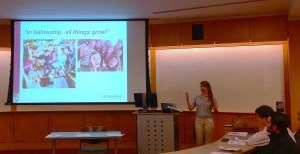
In an excellent talk, Melanie, HRC Council Historian followed Dr K's opening, with a presentation on HRC aspirations
In their excellent talk, HRC showed us an image of the high turnout to open student council meetings, but they noted that this level of engagement had taken attention and time. At the start of HRC, RAs were largely responsible for programming, but the the HRC council and other students are now largely responsible for programming (with the blessings of all, RAs included, though each RA still runs a couple of programs a month). Some activities that were student initiated and are long running are weekly soup nights, where a student volunteer has stepped up each year for the past few to create and serve soup once a week, like clockwork. Sunday morning pancakes follow the same model — yum to both! Both these activities are cited in this wonderful testimonial to HRC that I found on the Web, or this one goes into a bit of detail about soup night (try Googling soup night at HRC Virginia Tech)
All residents at HRC, first-year and upperclass, take a 1-credit hour seminar on HRC practices, policies, goals and visions, and traditions of their community. Indeed, the possibility of “College Halls seminars” noted in vision documents in WaM’s history are a generalization of this idea, as well as the first-year Commons seminars. That the HRC is running such seminars successfully, and for some time, is encouragement that we at WaM not forget about the possibility of (optional) upperclass 1-credit hour seminars. There are also “renegade seminars” at HRC, which are standalone events, initiated and led by both students and faculty. This reminded me of something that Patricia has suggested — that in addition to having our (Warren) dinners with faculty and staff guests as central “facilitators”, that we ask students to come in this role too. So that we might have one or more residents who just returned from study-abroad to come to dinner and talk about their experience; or a student who served in an internship; or a political campaign; and there are a slew of other experiences that would draw an interested few or a crowd — all good.
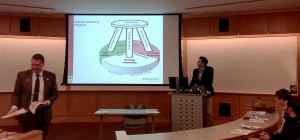
Sean, Director of Academic Enrichment, presenting on student leadership at HRC, with support from Dr. K
At HRC, suites are few, and are allotted to students who agree to to be community mentors and to make the suite’s common space available to the entire HRC. Indeed, a suite’s common space is technically considered HRC common space. No one should worry that this will become WaM policy, but it reminds me of the notable example of the inaugural residents on one second floor suite at Warren who opened their door to the larger community. What a great thing that was.
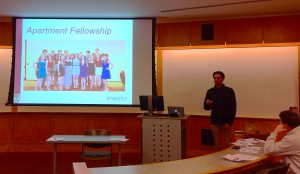
HRC's Graduate Assistant, Andrew, talking about Apartment fellowship, and the model of suite common space being HRC common space
The HRC group was very intrigued by the possibility of an interactive portal between WaM and HRC. While we successfully piloted the interactive portal in the Kissam Center with University College, Melbourne, earlier this year (and of course, the Commons portal installation was a great experience — I went twice!), a regular and consistent connection between WaM and Melbourne has been hampered by our differing summer breaks (we are in different hemispheres), various academic leaves and sabbaticals, even more so than due to the time differences. But a portal to HRC would be equally cool, perhaps as a portfolio of portal destinations, and this Tech(ie) group is enthusiastic. I plan to remind Professor Kaufman of that enthusiasm in the not too distant future 🙂 That is, if he doesn’t bug me first!
The HRC’s founding faculty principals were historians, and no surprise that there is a Historian on the HRC student council. This position, together with the others, notably the secretary and communications, are responsible for preserving a history of HRC. What a great idea! To a large extent we have also understood the importance of creating and preserving a WaM history, which is acknowledged in our Web pages, our blog, our Facebook groups, and tweets (and perhaps one day, by a student created Instagram account). For my part, I will probably start posting, to the History Web pages, public summaries of reports that I prepare each month and at the end of the year. But the idea that students, historians and otherwise, have a primary responsibility for documenting our community’s history is significant — talk about an immersive experience!
Thanks to HRC for thinking about us, visiting us, and thanks to all — more than any of us might think — who helped make this visit such a great experience. Let’s plan a road trip.
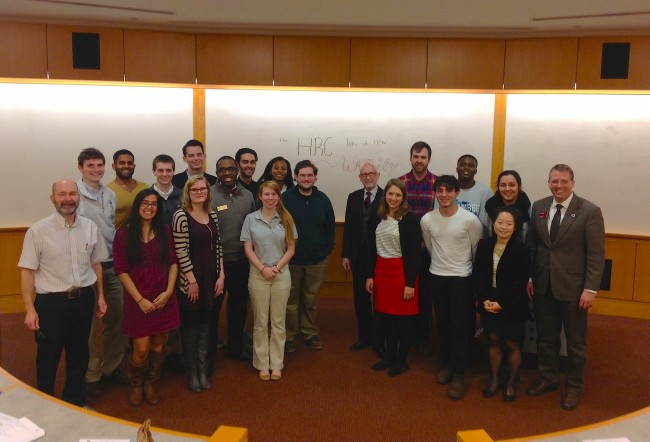
Post-HRC-talk pic. From roughly left to right: Doug (VU), Mitch (VT), Shawn (VU), Gargie (VT), Jordan (VT), Jamie (VT), Sean (VT), Linzie (VU), Andrew (VT), Melanie (VT), Jasmine (VU), William (VU), Dr. L (VU), Chelsie (VU), Nick (VU), Dean (VU), Chukwukpee (VU), Siham (VU), Grace (VU), Dr. K (VT). Photo by Matthew Sinclair (VU).
Posted by Douglas Fisher on January 23, 2016 in News
Visitors from Virginia Tech’s Honors Residential College
Welcome back, everyone!
Visitors from Virginia Tech’s Honors Residential College (HRC) are visiting this week. They will be arriving late afternoon on Tuesday, January 12 and departing about Noon on Thursday, January 14. The visitors team includes the Faculty Principal (aka Faculty Director or Head of House) of HRC, a “Graduate Fellow”, and 6 members of the HRC student council (i.e., President, Vice President, Secretary, Historian, Director of Academic Enrichment, and Director of Communication). I am particularly struck that HRC has the position of Historian on their council!
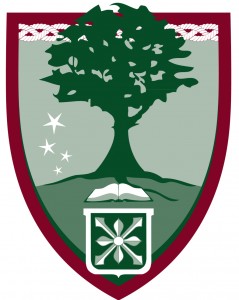
The HRC Crest
We have arranged a full schedule of OPEN thematic meetings — that means anyone can attend, including you!
The full schedule is below.
Students might be particularly interested in the HRC overview at 4:00 pm on Wednesday and the students-only breakout at 5:30 on Wednesday. But you are also welcome to join our various meals — just look for a group of strangers, who are eating with a group of familiar faces.
The visitors will be staying throughout Warren and Moore, so say hello.
For more information, contact your faculty director, graduate fellows, the AC, an RA, or college council member. We want to give and get plenty of ideas from these visitors!
SCHEDULE
All sessions OPEN, unless otherwise noted
Tuesday, January 12th
4:00 pm – 5:30 pm Arrival at Kissam Center
5:30 pm – 6:00 pm Tour of WaM
6:00 pm – 8:00 pm Take-out dinners at Kissam Kitchen (Mastercard and VISA accepted) and carry up to Moore Faculty Apartment
Wednesday, January 13th
7:30 am – 8:30 am Breakfast at Kissam Kitchen (Mastercard and VISA accepted)
8:30 am – 9:45 am WaM overview, including Community Development Plan (A105c)
9:45 am – 10:00 am break
10:00 am – 11:15 am Program Assessment (A105c)
11:15 am – 12:30 pm Tour of Vanderbilt Campus (meet at Kissam info desk)
12:30 pm – 1:15 pm Lunch at The Ingram Commons (cash, Mastercard, Visa accepted)
1:15 pm – 2:30 pm The first-year experience (Commons Center Conference Room)
2:30 pm – 3:00 pm Break
3:00 pm – 4:00 pm Application Processes, Study Abroad (A105c)
4:00 pm – 5:00 pm Overview of Honors Residential College (Kissam Classroom, C216)
5:30 pm – 7:00 pm Role-specific dinner and breakouts
- Student-only breakouts (Student Councils of HRC, Warren, and Moore student councils and other interested students) (Kissam MPR)
- Faculty and Professional Staff (open to all residential faculty and staff) (B503). TENTATIVE, depending on response – there is an important Chancellor Roundtable on Climate Change from 5:00 – 6:30 that some of us will attend, as well as faculty recruiting conflicts at Blair. PLEASE RSVP IF INTERESTED
- Grad Fellows (HRC, WaM, other LLCs) (B106)
7:00 pm Free time, with possible trips off campus
Thursday, January 14th
7:30 am – 8:30 am Breakfast at Kissam Kitchen (Mastercard and VISA accepted)
8:30 am – 9:45 am TBD (e.g., application processes, academic/residential interactions, HRC/WaM joint projects)
10:00 am – 11:00 am Meet with Vice Provost Cynthia Cyrus, Dean of Students Mark Bandas, Randy Tarkington, Senior Director of Residential Education, and Traci Ray, Director of Residential Education (Closed) (A105c)
11:00 am – 12:00 pm Lunch at Rand (cash, Mastercard, Visa accepted)
12:00 pm Depart
Hosts:
Moore College Personnel: http://www.vanderbilt.edu/collegehalls/personnel/moore-personnel.php
Warren College Personnel: http://www.vanderbilt.edu/collegehalls/personnel/warren-personnel.php
Moore College Council: http://www.vanderbilt.edu/collegehalls/colleges/moore/student-governance.php
Warren College Council http://www.vanderbilt.edu/collegehalls/colleges/warren/warren-college-council.php
Dean of the Martha Rivers Ingram Commons: http://commons.vanderbilt.edu/facultyandstaff/dean.php
Posted by Douglas Fisher on January 11, 2016 in News
Nathaniel Rich at the Warren and Moore Environmental Series Dinner: Addressing modern anxieties through fiction
This is a guest post by Alisha Newton. Alisha is a junior in Peabody College and the editor-in-chief of Orbis, a student-run publication on environmental issues.
Last month, I attended a dinner with author Nathaniel Rich to discuss his novel Odds Against Tomorrow, which has been hailed as the pioneering work of a new genre of literary fiction known as “climate fiction” (cli-fi for short). The dinner was hosted by Dr. Doug Fisher and his wife Patricia in Warren College, as part of the Warren & Moore Environmental Series (#enVU).
In writing Odds Against Tomorrow, Rich wanted to address the anxiety of the modern age in all of its forms. “Natural disasters, epidemics, terrorism, nuclear war, financial collapse — it’s all in there,” he says. It is the man-against-nature story of what happens to disaster-obsessed mathematician Mitchell Zukor when a Category-3 storm hits Manhattan.
We talked about the process of writing such a novel: “Research is how writers procrastinate,” joked Rich. In researching his novel, he read books about probability math and descriptions of natural disasters such as the Dust Bowl in the 30s. He read biographies of famous scientists and mathematicians to get inside their heads, and he studied flood scenarios of New York City.
At the dinner, we also discussed the role of fiction in the discourse on environmental change. “Ethical journalism is not allowed to be sensational, and yet many facts about the future are scary. People have this hunger to engage with their fears, and fiction is an outlet for that,” says Rich. During the Cold War, he says, people could read spy stories and other thrillers like 1984 by George Orwell, but in today’s world, people just go on the Internet and obsess over the seismic activity of the Yellowstone caldera.
It was an engaging discussion, but when you’re sitting in the well-furnished living room of a professor at a top-15 university, speaking to an acclaimed author over plates of vegan crab cakes and kale salad catered from Whole Foods, seltzer water in hand, it can be hard to grasp reality.
Reality is that in October 2012, “superstorm” Sandy ravaged the Eastern Seaboard from Florida to Maine, flooding New York City with a 13-foot storm surge and costing the United States $71.4 billion in damages. Reality is that this won’t be the last time a storm takes Sandy’s unusual path — the “left hook” directly into New Jersey — will be more common as mid-Atlantic ocean waters warm, according to some geoscientists.
In attendance at the dinner was Prof. Teresa Goddu of the English department. Goddu commented that in the novel, the storm incapacitates Wall Street, the symbol of our country’s economic strength. Yet as soon as the waters recede, the machine starts again, and the underlying issues are never resolved. There’s the sense that there will be another disaster, that this will happen again.
“How can we make peace with the uncertainty of the future?” asks Goddu. “To what extent do we freak out, and to what extent do we proceed with our lives?”
Personally, I believe neither route is the answer; it doesn’t help anyone to stay up nights fretting about the impacts of climate change, but on the other hand, we cannot proceed with business as usual. The problem of global climate change demands that we change our lifestyles and our national and international policies. Susceptible as they are to storm surges, the Manhattanites are on the right track: living smaller, living closer, and driving less, as part of overall increases in urban density, are key in reducing carbon emissions. Globally, we must take political action that looks out for the interests of vulnerable developing countries, especially those with large agricultural sectors. The future is highly uncertain, but like the protagonist in Rich’s acclaimed cli-fi novel, we can take action.
This post is a contribution by Alisha Newton, Class of 2017, and it does not necessarily represent the opinions of Vanderbilt University.
Posted by Douglas Fisher on October 27, 2015 in News
Open House and the Warren Faculty, Grad Fellow, and Study Suite
Welcome back! Don’t forget the Open House at the Warren College Faculty apartment (B503) from 9:30 am to Noon on Sunday, August 23 (students, family, and friends welcome).
And see the homemade tour of the Warren College Faculty Office suite, with the Warren College Faculty Director and the Warren Graduate Fellows. The tour features a special study room accessible to Warren students by card swipe, a video production studio available to students who go through training, and the faculty and grad fellow offices, which we encourage all Warren students to visit with ideas for activities!
Tour: https://youtu.be/krTNS5PI7Z8.
Finally, the Kawai upright piano in the Warren Great Room is unlocked and ready to be played!
This is a guest post by Doug Fisher, Faculty Director of Warren College
Posted by Douglas Fisher on August 21, 2015 in News
Move in is around the corner!
Move in is less than two weeks away! Wow! Its been a great summer, but as with every summer of my 28 years at Vanderbilt, I’m looking forward to the return of students. For most of those years, its been computer science and engineering students I’ve welcomed back, then McGill students, and now Warren (and Moore) students.
- August 12: Deadline for students to pay fall charges without a late payment fee
- August 20: International student orientation
- August 22: First-year and transfer student move-in day
- August 23: Upperclass residence halls open at 9 a.m.
- August 22-24: Orientation for transfer students
- August 26: First day of class
Find the complete official schedule at http://www.vanderbilt.edu/families/calendar/.
On Sunday, August 23, the door to Warren 503 will open at 8:00 am for breakfast for RAs, and will remain open at 9:30 am until about Noon (when the Welcome Wagon starts), so drop in, and visit with Patricia and I, other students, families, and friends in our big open common living space. We’ll have food and drink too, including some of my dynamite oat cakes!
See you soon!
This is a guest post by Doug Fisher, Faculty Director of Warren College.
Posted by Douglas Fisher on August 10, 2015 in News
The Truth about Warren and Moore Colleges
At the very end of Spring 2015, VandyRadio interviewed Moore Faculty Director Jim Lovensheimer, Area Coordinator Matthew Sinclair, and me. The interview was posted on the College Halls at Vanderbilt Facebook group, which is where I discovered it last night. On listening, I was struck by how articulate Matthew and Dr. L were, and also how perceptive and informed our interviewers, Chukwukpee Nzegwu and Alex Slawson, were. The title of the podcast — The Truth about Warren and Moore — is delightfully suggestive, and I decided to keep it.
I remember the late night April 20 interview on the Monday Minds show, sitting around in a ellipse. The studio reminded me of my two years as a DJ in college, at WRNV — nice flashback!
I became perceptibly more relaxed as the interview progressed — I think others did too. There was modest editing to move the podcast along. I remember, for example, a long pause after Chukwukpee’s first question, but post editing, I jumped all over that question 🙂
The VandyRadio site of the podcast is https://soundcloud.com/vandyradio/monday-minds-reveals-the-truth-about-warren-and-moore. I took notes on questions as I listened. The radio interview treated “college halls”, “LLCs” (Living and Learning Communities), and “residential colleges”, as roughly synonymous. The outline below lists timestamps of all questions, so the distance between timestamps indicates the level of discussion.
00:19 What is the residential college system at Vanderbilt?
01:27 What are the responsibilities of faculty directors?
03:00 Is all of Vanderbilt’s residential life headed toward an LLC system?
03:55 Is there a place for students who don’t want to engage in an LLC setting?
06:15 How do you enforce engagement in college halls’ communities?
07:15 What are the relationships between Warren|Moore and The Commons?
10:45 What about the complaint that there is little transparency in programming?
15:50 What is Warren|Moore to Vanderbilt?
16:40 Does programming (clutter) in residential colleges “baby” its students?
22:25 Do you assess programming (clutter)?
24:37 What are next steps in college halls building development?
26:40 Is spending on residential life the best use of Vanderbilt’s resources?
30:01 Does college halls encourage cliqueness, or inclusiveness instead?
35:10 What is the application process for Warren|Moore?
36:44 What are the weaknesses of Warren|Moore?
40:39 Will residential colleges develop individual personalities?
46:55 Sign off
This post is a contribution by Douglas Fisher, Faculty Director of Warren College, and it does not necessarily represent the opinions of Vanderbilt University.
Posted by Douglas Fisher on July 23, 2015 in News
A WaMily College Halls Cookbook
Jo Ann McIntire, the College Halls Administrative Assistant, pointed out that the Vanderbilt Admissions blog had a recent post on selected eateries in the vicinity of Vanderbilt (http://admissions.vanderbilt.edu/vandybloggers/2015/07/what-we’re-eating-summer-2015-edition/). Jo Ann’s idea was to do something similar on the College Halls blog — what a great idea! We’ve been wanting more activity on the blog, and what better topic than food to encourage participation! Everyone loves food. I’m hoping that Jo Ann does the kickoff post on favorite places to eat around here. Lets see what she comes up with.
I’ve been making some progress of the food front too, but at home in Warren 503. I’m hoping to help my wife Patricia out at Fisher’s Fresh Baked Friday’s, so named by alum Head Resident Samara Lieberman, a master of alliteration. I’ve also been getting in touch with my Scottish heritage. In particular, I’ve been cranking through variations on Scottish oatcakes from different regions of Scotland. My absolute favorite are adaptations from “Scottish Fare” compiled and self-published by Norman and Gordon Latimer (1983):
“MIDLOTHIAN OATCAKES”
“Oatcakes like shortbread are made in many different varieties but this recipe is a favorite around Edinburgh and the Lothians.
1/2 cup plain flour
1 cup medium oatmeal
3 oz. butter
1 teasp. baking powder
1/2 teasp. salt
water to mix
Place flour, oatmeal, baking powder and salt in a bowl. Melt the butter. Make a well in the centre of the flour mixture and add the melted butter and enough water to make a stiff dough. Roll out the dough on a floured board and cut into rounds about 2 1/2 ins. in diameter. Bake in a warm oven (300F) for 30 minutes.”
You may need very little water, and I’d add it a teaspoon or two at a time until you know what you are doing — the dough should get just beyond the crumbling stage. Roll the dough out to about 1/4 inch in thickness. These are the oatcakes I remember my grandmother making!
The lack of sugar results in a very subtle sweetness from the oats and butter, but I will typically add a 1/2 – 1 teaspoon of stevia powder to the dry mix for a slightly sweeter version. I’ll add about a tablespoon of grated parmesan cheese to the dry mix for a savory version. I’ve also used olive oil instead of butter, should you want a vegan version, and its delicious — I can’t tell much of a difference. I’ve also mixed in a bit of peanut butter — all good. The variations on this simple recipe are endless.
These are good out of the oven, but I like to grab them from the freezer. I’ll probably be cranking these out en masse on selected Thursday nights for the early crowd at FFBF. I dropped some oatcakes off with Matthew and Andrea Sinclair, along with scones (yet another story), and apparently they did something very smart — Matthew took the oatcakes and Andrea took the scones — these are very wise people! (Professor Lovensheimer was out of town, but he’ll benefit from my next batch).
The oatcakes are the rounders around the perimeter, and scones are in the center.
Why are my oatcakes worthy of a blog post? Because there was serious talk last year of a College Halls Cookbook, something that could serve as a resource for Warren and Moore’s four student kitchens, student kitchens around Vanderbilt, and anywhere else if the WaMily cookbook (https://en.wikipedia.org/wiki/Family_cookbooks) is Web accessible. And as easy, delicious, and healthy as these are, I’m advocating that they be the inaugural entry.
If you have thoughts on a crowdsourcing platform that could serve as the College Halls WaMily Cookbook, I would love to hear it! And if you want to design a cover for the WaMily Cookbook, let’s talk too! And if you want to do a blog post on food or other topics, then please let us know as well — we want to have lots of student involvement on the blog!
And thanks Jo Ann for opening our imagination!
This is a guest post by Doug Fisher, Faculty Director of Warren College. This post reflects Doug’s opinions, which are not necessarily the opinion of Vanderbilt University (but these oatcakes are pretty darn good).
Posted by Douglas Fisher on July 21, 2015 in News
Warren and Moore Alums
The last day of class is just 3 weeks away, and in a year of firsts, Warren and Moore Colleges will each have their first alums a short time later!
I hope that Warren College alums will continue to talk with us, through our Warren and College Halls Facebook groups, through other digital connections that we make pervasive and natural, and through in-person visits. Our community is so young, that alums can substantially influence what Warren becomes. Indeed, Warren’s relationship with its alums could become one of its distinctive and definitional characteristics, at Vanderbilt, and any where else for that matter.
I have been looking for ways of engaging with Vanderbilt alums in my teaching, through mechanisms of digital learning. So, its natural that I would look for ways of engaging with Warren alums.
Whether you will be an alum or a student of Warren next year, lets talk about ways that Warren (and Moore) alums can and will continue as part of our nascent community. For example, if Warren establishes a seminar series, for credit or not, can alums participate remotely through video-conferencing, bringing with them the benefit of their experience? Can alums routinely speak with current students, perhaps by “skyping” into Sunday faculty apartment dinners or fireside chats, perhaps to talk with faculty they didn’t have the opportunity or inclination to engage deeply with while here? Perhaps Warren alums can have Warren “office hours” once or twice a year, and/or sit for an interview with the Warren newsletter.
Some may think only students who have been here 2-3 upperclass years will develop a bond with Warren strong enough to stay engaged after graduation, but I can name current seniors who I am sure will remain engaged if encouraged and welcomed to do so.
So, lets look for programs that will engage Warren and Moore students and alums — and if any of you seniors want to take database or artificial intelligence later on, after graduation, let me know — we can work something out.
“[A]nd soon now we shall go out of the house and go into the convulsion of the world, …” ― Robert Penn Warren, All the King’s Men
Posted by Douglas Fisher on March 27, 2015 in News
quaerenti unus pro omnibus, omnes pro uno
I think that most all understand the policy on study abroad students wanting to return to Warren College (or Moore College) — they will have to reapply to Warren and Moore in the open lottery, though they will receive a priority status relative to other students who are in their class (e.g., among other rising seniors).
A group of students living in Warren College during Spring cannot partner with a returning study-abroad student and still go through the internal lottery — such a hybrid group would have to go through the open lottery.
The “safe” approach, where “safety” assumes that staying at Warren is prioritized above other factors, is for the group living at Warren now to go through the internal lottery as an entirely self-contained group, with no “empty slot” held out for the student abroad. Under the “safe” path, the resident who is returning will go through the open lottery to return to Warren (or Moore for that matter, because it is an open lottery for Warren and Moore).
The policy is intended to take into account a number of factors, including continuing to ensure good balance across all three upper classes.
I hope that an assurance of returning to Warren can be given in future years to students who study abroad and who have lived at Warren for several semesters already. Warren and Moore represent a continued commitment by Vanderbilt University, which began with the Commons, to rethink and encourage persistent, supportive communities on campus. Warren and Moore aren’t just buildings — they are communities. After all, I want students to commit to Warren, and I want to commit to them — a Warren community member who studies abroad, is still a Warren community member, or so we aspire to that ideal in practice and in theory. The study-abroad policy is an important issue that we will revisit for future years, but this year the policy that is in place is an appropriate one, balancing a number of factors, and indeed it may prove to be the best policy going forward as well — we’ll see. Your comments are welcome!
Again, a “safe” strategy for those currently living at Warren for guaranteeing housing at Warren, is to go through the in-house lottery with one, self-contained group, with the returning student going through the open lottery, with a priority, but no guarantee (i.e., there has to be a class-specific slot available when the returning student rises to the top of the queue relative to other returning students).
My focus has been on Warren College in this post, but of course, my comments apply to Moore College as well.
Doug Fisher is the Faculty Director of Warren College, the Director of the Vanderbilt Institute for Digital Learning, and an Associate Professor of Computer Science and of Computer Engineering. The opinions herein are Doug’s and do not necessarily represent the opinions of Vanderbilt University.
Posted by Douglas Fisher on February 11, 2015 in Moore, News, Warren
Students will have the right to return to their College
This is a guest post by Doug Fisher, Faculty Director of Warren College.
Over Thanksgiving break, a Warren resident told me that some Warren and Moore students were confused on the rules regarding whether rising juniors and rising seniors would be able to stay at Warren or Moore, respectively. The answer is “YES!”, unless a student works hard at being removed.
As the College Halls Web pages indicate:
“Once students enter Warren or Moore college in their sophomore year, they can remain in the same college as juniors and seniors.” (http://www.vanderbilt.edu/collegehalls/)
This expectation of continuing through senior year also applies to those who enter Warren or Moore as Juniors (which will be relatively few in the years to come).
The motivation for promoting continuity in each college’s community is straightforward and common to other residential college systems (e.g., UC Santa Cruz, Rice University, Yale College):
“This residential option conveys the ambience of a small college community, while still affording students an education at a world-class research university with a wide variety of undergraduate academic programs.” (http://www.vanderbilt.edu/collegehalls/)
Warren and Moore aren’t just buildings — they are communities — and communities don’t boot people out without good cause. Students can, of course, opt to leave Warren or Moore, and enter into other Vanderbilt housing options.
Importantly, Warren and Moore aren’t interchangeable — if you are a member of the Warren community, there is nothing that privileges you above any other Vanderbilt student if you want to enter Moore (nor vice versa).
The vision of College Halls as small residential communities within larger academic institutions are much older than Vanderbilt’s College Halls, but this vision is affirmed in a series of reports that paved the way for College Halls (http://www.vanderbilt.edu/collegehalls/history/task-force.php). Here are some quotes from one of those reports (http://www.vanderbilt.edu/collegehalls/CH_Student%20Selection%20Task%20Force_Final7Dec2012_clean.pdf).
“In College Halls, any member of the college may choose to remain in a subsequent year. Under a self-governance model, however, the community of a given college may choose to consider a given disruptive student’s strong negative impact on the community and prohibit his/her return, mirroring McGill’s “concern for community” measure.”
In sum, you have a right to stay, unless you work at being told not to return.
“(The Faculty Director is asked to adjudicate if too many students are asked not to return; this should be a rare exception to our campus process.)”
The Faculty Director’s role as “adjudicator” is made clear here. But “who” has asked the “too many students not to return”? The report does not say directly, but the context suggests “the community”, presumably of students, through their reports to staff.
“We may also look ahead to the revisions needed for the second round of selections, given the premise that students will have the right to return to their College. “
The first phrase in this statement is about selection of NEW students to College Halls (and the topic of a post I’ll be making to this blog soon), but the second phrase clearly says “the right” to return (and its the phrase that I’ve used as the title of this post).
As this quote also suggests, if residents in the Warren and Moore living and learning communities have a right to stay once here, some advocate that there be a revision to the first year’s application process, which only required a passive checking of boxes.
What the College Halls Task Force reports (http://www.vanderbilt.edu/collegehalls/history/task-force.php) say about the issues of new applicants, squatting in the same room, and the nature of the Warren and Moore living and learning communities will be topics of posts soon. These reports don’t put a hard limit on what Warren and Moore can become (indeed, they acknowledge that the College Halls vision will evolve), but they do represent hard work by dedicated people, and so deserve a close look for the potential guidance they provide.
**This guest post reflects Doug’s opinions, and not necessarily those of Vanderbilt University.
Posted by Douglas Fisher on November 28, 2014 in Moore, News, Warren

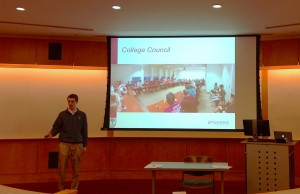
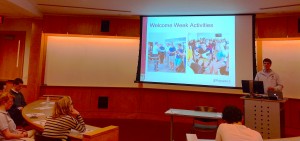
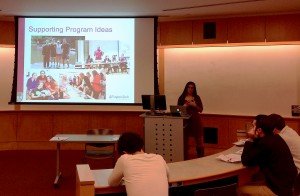
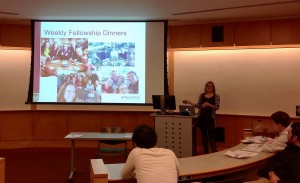
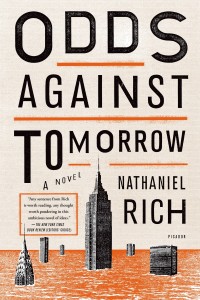
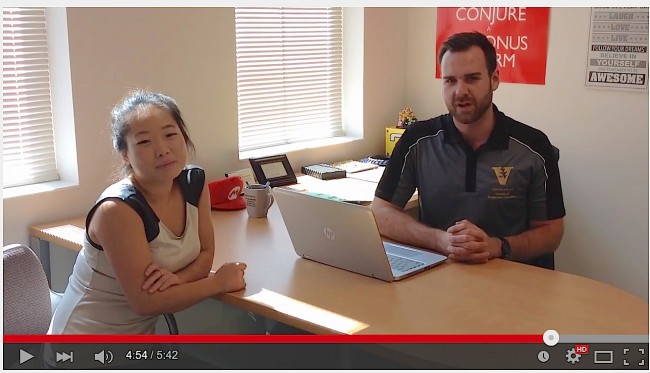
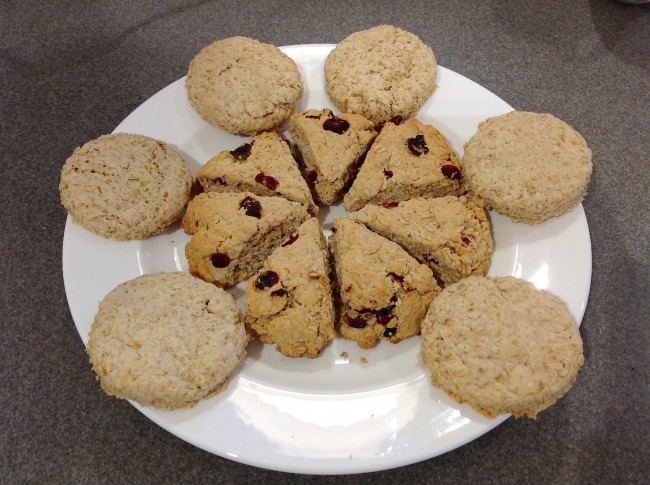
©2026 Vanderbilt University ·
Site Development: University Web Communications